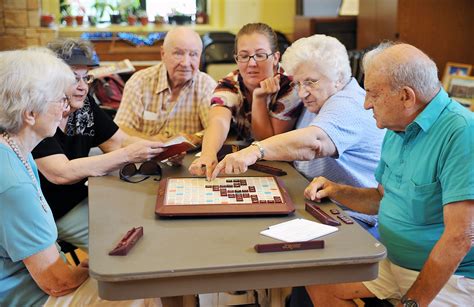As we age, it is essential to maintain active social lives, engage in stimulating activities, and take care of our physical and cognitive health. Group activities are a fantastic way for seniors to address all these aspects, fostering a sense of community, promoting well-being, and improving overall quality of life.

Why Are Group Activities Beneficial for Seniors?
Group activities offer numerous benefits for seniors, including:
- Enhanced Socialization: Engaging in group activities helps seniors connect with others, build relationships, and feel part of a community. This social interaction can reduce feelings of isolation, depression, and loneliness.
- Improved Physical Health: Many group activities involve physical movement, such as exercise classes, dancing, or gardening. These activities can improve mobility, balance, strength, and overall physical fitness.
- Cognitive Stimulation: Group discussions, puzzles, games, and educational programs challenge seniors’ minds and help maintain cognitive function. This stimulation can reduce the risk of cognitive decline and dementia.
- Stress Reduction: Participating in enjoyable group activities can promote relaxation, reduce stress, and improve mood.
- Increased Happiness: Socializing, engaging in activities they enjoy, and feeling a sense of purpose can significantly boost seniors’ happiness and well-being.
Types of Group Activities for Seniors
The options for group activities for seniors are endless, and they can be tailored to specific interests, abilities, and needs. Here are some popular types of activities:
1. Social Activities:
– Social clubs
– Coffee mornings
– Book clubs
– Discussion groups
– Volunteer opportunities
2. Physical Activities:
– Exercise classes (e.g., yoga, tai chi, Zumba)
– Walking or hiking groups
– Swimming or water aerobics
– Dancing lessons
– Gardening
3. Cognitive Stimulation Activities:
– Puzzle groups
– Games (e.g., board games, card games, trivia)
– Educational programs
– Art or music classes
– Reading circles
4. Creative Activities:
– Painting or drawing classes
– Knitting or crocheting groups
– Singing or choir
– Theater groups
– Writing workshops
How to Find Group Activities for Seniors
Finding group activities in your community is easy. Here are some resources:
- Senior Centers: Senior centers offer a wide range of activities, including social, physical, and educational programs.
- Community Centers: Community centers often host group activities for seniors, such as exercise classes, social events, and workshops.
- Libraries: Libraries frequently have book clubs, discussion groups, and other activities for seniors.
- Religious Organizations: Many churches and synagogues offer group activities for seniors in their community.
- Online Resources: Websites like Meetup and Eventbrite list group activities in your area, including those specifically for seniors.
Tips for Choosing the Right Group Activities
When choosing group activities for seniors, consider the following factors:
- Interests: Choose activities that align with the seniors’ interests and hobbies.
- Abilities: Consider the seniors’ physical, cognitive, and social abilities when selecting activities.
- Location: Choose activities that are conveniently located and accessible.
- Time: Make sure the activities fit into the seniors’ schedules and transportation availability.
- Cost: Consider the cost of the activities and if there are any financial assistance options available.
Common Mistakes to Avoid
When planning group activities for seniors, avoid these common pitfalls:
- Lack of Variety: Avoid planning activities that are all the same type (e.g., only physical activities).
- Insufficient Planning: Don’t start activities without proper planning, such as securing a venue, arranging transportation, and ensuring adequate supervision.
- Ignoring Safety Concerns: Always prioritize safety by ensuring the activities are appropriate for the seniors’ abilities and that necessary precautions are taken.
- Neglecting Socialization: While some activities may focus on exercise or cognitive stimulation, it is important to incorporate elements of social interaction to foster a sense of community.
- Overcrowding: Limit the number of participants to a manageable size to avoid overwhelming seniors and ensure everyone has an enjoyable experience.
Conclusion
Group activities play a vital role in the well-being of seniors. They provide opportunities for socialization, physical engagement, cognitive stimulation, and overall happiness. By considering the factors discussed above, you can select and plan group activities that cater to the specific needs and interests of seniors, fostering a sense of purpose, community, and a fulfilling retirement experience.
